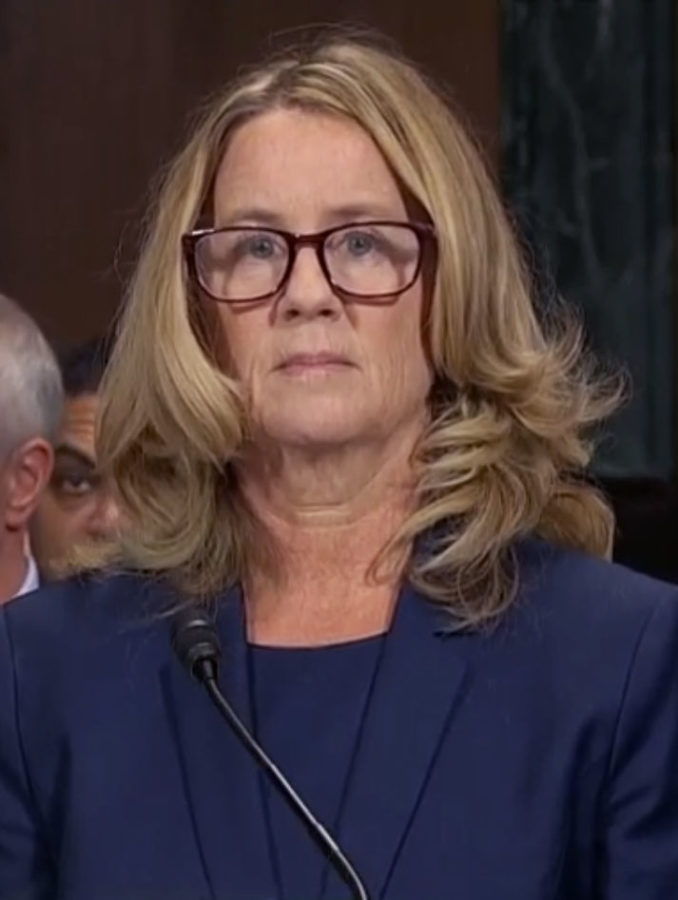Angry, ashamed and afraid: Ford testimony reflects Iowa State students’ feelings
Christine Blasey Ford during her hearing on Sept. 27, 2018.
October 1, 2018
Iowa State students reported feeling angry, embarrassed and afraid after being sexually assaulted, when responding to Iowa State’s campus climate survey. Over half felt as if they were somehow responsible.
Christine Blasey Ford echoed these feelings on the national stage, testifying in front of the Senate Judiciary Committee on Thursday, telling them that she felt ashamed and afraid after being sexually assaulted.
The campus climate survey revealed that Iowa State students shared in Ford’s feelings of anger and shame after a sexual assault, as well as frustration with reporting procedures.
In Ford’s opening statement, she said since Kavanaugh did not rape her, she felt like she should be able to move on and pretend it did not happen.
The campus climate survey asked students why they did not report being assaulted and found similar themes.
“I didn’t feel that it was worth mentioning to authorities. I wasn’t raped, so I didn’t feel it was a serious issue,” one student wrote.
Not recognizing sexual assault when it happens is a common barrier to reporting, said Tricia Ingram Williams, campus prevention and outreach advocate at the Assault Care Center Extending Shelter and Support (ACCESS).
“Many students don’t recognize that what has happened to them is sexual assault,” Williams said. “We often think of rape as occurring in a dark alley with a stranger as the perpetrator. Unfortunately, the majority of sexual assaults are perpetrated by someone known to the survivor. It can be hard to admit to oneself that a sexual assault has occurred, none-the-less find the immense courage it takes to report.”
Of the 554 respondents who indicated they had experienced unwanted sexual interaction, seven percent officially reported the incident. The survey defined unwanted sexual interaction as catcalling, repeated sexual advances or sexual harassment. Of those who filed a report, 30 percent were satisfied with the outcome.
Two hundred twenty-one respondents indicated they had experienced unwanted sexual contact, which the survey defined as rape, sexual assault or penetration without consent. Ten percent officially reported the incident. Of those who reported, half indicated they were satisfied with the outcome.
Iowa State’s reporting rate, as found by the campus climate survey, is lower than the national reporting rate of female student victims. According to the Rape, Abuse, and Incest National Network, 20 percent of female student victims report to law enforcement.
Karen Scheel, senior lecturer in psychology at Iowa State, said the myths that the victim provoked the attack, enjoyed the attack or lied about the attack often have an influence on report rates.
“When victims worry that they won’t be believed or that their character or credibility might be attacked, sometimes that’s true,” Scheel said. “It takes a tremendous amount of bravery to put yourself out there when you are in one of your most vulnerable moments, not knowing how you’ll be received, and whether you will be attacked again.”
Williams said these issues can stem from a general lack of knowledge about healthy ways to discuss sexual violence.
“A lot of people don’t know how to talk about sexual assault in a healthy way,” Williams said. “Many survivors are faced with disbelief when telling friends or family about their sexual assault. If we merely start by believing when our friends and family tell us about experiences of sexual assault, we can drastically reduce the amount of shame surrounding these discussions.”
Another barrier to reporting could be certain aspects of the process, Williams said.
“I believe that many students feel that their hands are tied when it comes to reporting,” Williams said. “Often, if a student comes forward with a report of sexual assault on a university campus an investigation process will occur regardless of the student’s preferences. This can make students hesitant to come forward.”
Iowa State offers confidential resources as well as official reporting resources to survivors of sexual violence. The classification helps determine if a resource is required to disclose the information to the university.
“There’s confidential sources of help on campus, and then there’s mandatory reporters on campus,” Scheel said. “So if you tell a professor you were sexually assaulted, the professor needs to talk to the university’s equal opportunity office, but if you talk to ACCESS they don’t.”
Confidential resources, such as ACCESS, professionals at ISU Thielen Student Health Center and ISU Student Counseling Services, cannot share information that a survivor tells them. They are not required to file a report and are now able to be subpoenaed to testify against the survivor in court.
Iowa State also offers “campus confidential” resources, which are not required to file a report, but are able to be subpoenaed. These resources include the Margaret Sloss Women’s Center and the LGBTQIA+ Success Center.
The Office of Equal Opportunity, Dean of Students Office, and ISU Police Division are all required to report sexual misconduct to the Title IX Coordinator and may be subpoenaed to testify in court.







